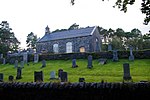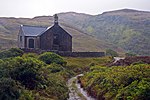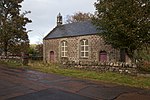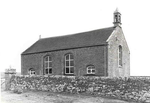Telford Parliamentary church
Telford Parliamentary church also known as the Telford Kirks are a series of presbyterian churches in Scotland built with money voted from the parliament of the United Kingdom as a result of the Church of Scotland Act 1824 for a grant of £50,000, designed by the surveyor William Thomson and built by the Scottish stonemason and architect Thomas Telford.[1][2] In total, 32 churches were built and many are still in use today. Others have been abandoned, e.g. at Stoer, while others were destroyed and rebuilt, e.g. at Tobermory, while others have been converted to dwellings.
History
[edit]At the beginning of the 19th century, the provision of churches in the whole of Britain, and in the Highlands in particular, no longer matched the spiritual and religious requirements of the population. Most Highland parishes were large areas of rough mountainous land, and many parishioners, especially those who had been cleared from the land, or who lived in one of the new villages that were coming into existence around that time, lived so far from the parish kirk that they could not attend worship regularly, which was seen as a bad thing. Besides gaps in the provision by the Church of Scotland, there were also pockets of other religious denominations, including Roman Catholic and a variety of minor sects, which were seen as undesirable by the Church of Scotland and by the government.[3]
After the Napoleonic Wars, Parliament made available £1,000,000 in 1819, with a further £500,000 in 1824, for the building of churches and chapels for the Church of England, as an expression of gratitude to God for victory. 214 "Commissioners' Churches" were built or refurbished; one of these alone is said to have cost the best part of £77,000 (equivalent to £6 million in 2014), though much of this was not government money.[3]
A similar proposal to provide £200,000 for the Church of Scotland was delayed for years by various political difficulties and obstruction, and when an amended Bill was eventually passed in 1824, it provided just £50,000 for the whole of the Highlands. No more than 30 kirks with manses were to be built, and no more than £1500 (equivalent to £125,000 in 2014) was to be spent on any one site. A similar Bill for the Lowlands failed altogether in 1825. So the whole of Scotland got a Parliamentary grant of less than was spent on one single Church of England building; and the majority of parishes, and parishioners, in Scotland got nothing at all.[3]
The task of selecting the sites and overseeing the work was entrusted to the Commissioners for Building Highland Roads and Bridges, and in particular to their Chief Surveyor Thomas Telford. The Bill required that the heritors, should apply for a new kirk to be built on land that they would make available, and in August 1825 the Commissioners considered 78 applications; eighteen more were received by June 1826, and eventually, and not without difficulty, sites were chosen for 32 kirks and 41 manses, the extra manses to be provided where there was already a kirk, but no manse.[3]
Design
[edit]Between 1823 and 1830, Telford was responsible for the management of construction of the highland churches northwards from Islay to the Shetland.[4] In the year between 1823 and 1824 he prepared estimates, plans and specifications for a standardised structure that was based on one submitted proposal of his three surveyors,[4] James Smith, Joseph Mitchell and William Thomson.[2] Thomson had asked his three surveyors to submit designs for a kirk and manse with a specific budget and caveat that the kirk had to be constructed in a manner that would resist a stormy climate.[2] The eventual plans that were adopted came from William Thomson and considered austere in design.[4]
The layout of each church followed a simple rectangular or a T-plan design each with small belfry. In a rectangular design the tall lattice windows are located in the side walls. For the T-plan, an extension was built at the rear with the lattice windows are on the side walls.[2] The standardised windows design was used so that they could be supplied ready made by James Abernethy of Aberdeen. Original window frames survive in several churches e.g. in Croick, Iona and Ullapool.[2] The doors also standardised, used four-centred arches for support.[5]
List of churches by location
[edit]| Telford Parliamentary church | ||||||||
|---|---|---|---|---|---|---|---|---|
| Name | Parish | Image | Formal name | Built by | Built date | Grant | Declared | Reference, location and notes |
| Acharacle | Kilchoan, Argyll | 
|
Acharacle Parish Church | William Thomson | 1829 | £1478 12s 7d | Declared a Quoad sacra parish by an Act of Assembly on 25 May 1833 and erected as such by the Court of Tiends on 8 June 1859.[6] | 56°44′55″N 5°48′13″W / 56.748732°N 5.803508°W[7][8] |
| Ardgour | Kilmallie, Lochaber | 
|
Ardgour Parish Church | John Davidson and Thomas Macfarlane | 1829 | £697 17s 3d | Declared a Quoad sacra parish by an Act of Assembly on 25 May 1833 and erected as such by the Court of Tiends on 31 December 1845.[9] | 56°43′36″N 5°15′13″W / 56.7267312°N 5.253481°W |
| Berneray | Kilbride, Harris | 
|
Converted into a private house | John Davidson and Thomas Macfarlane | 1829 | £1500 for kirk and manse | 57°43′22″N 7°10′19″W / 57.722737°N 7.17193°W [10] | |
| Berriedale | Latheron | 
|
Berriedale Church | William Davidson | 1826 | £1473 18s 1d | Declared a Quoad sacra parish by an Act of Assembly on 25 May 1833 and erected as such by the Court of Tiends on 9 December 1846.[11] | 58°11′21″N 3°29′46″W / 58.189167°N 3.496111°W |
| Carnoch | Contin | 
|
Converted into a private house | John Davidson and Thomas Macfarlane | 1830 | £1500 | Declared a Quoad sacra parish by an Act of Assembly on 25 May 1833 and erected as such by the Court of Tiends on 16 March 1864.[12] The last parliamentary church built in the highlands.[12] | 57°32′33″N 4°51′20″W / 57.542508°N 4.855508°W |
| Croick | Kincardine, Ross and Cromarty | 
|
Croick Parish Church | James Smith | 1830 | £1426 10s 11d | Declared a Quoad sacra parish by an Act of Assembly on 25 May 1833 and erected as such by the Court of Tiends on 4 March 1846.[13] | 57°53′10″N 4°36′16″W / 57.886183°N 4.604583°W |
| Cross | Parish of Barvas, Ross and Cromarty | 
|
1829 | £1470 | Declared a Quoad sacra parish by an Act of Assembly on 25 May 1833 and erected as such by the Court of Tiends on 27 May 1857.[14] | Demolished. | ||
| Duror | Appin, Argyll | 
|
Duror Parish Church | John Gibb and William Minto | 1827 | £1470 | Declared a Quoad sacra parish in 1827[15] | 56°38′47″N 5°16′26″W / 56.646278°N 5.273959°W [16] |
| Hallin | Kilmuir, Inverness-shire | 
|
John Davidson and Thomas Macfarlane | 1829 | £1470 | Declared a Quoad sacra parish by an Act of Assembly on 25 May 1833 and erected as such by the Court of Tiends on 14 July 1847.[17] | 57°32′26″N 6°36′03″W / 57.540556°N 6.600833°W | |
| Iona | Kilfinichen and Kilvickeon, Argyll | 
|
William Thomson | 1828 | £1503 4s | 56°19′57″N 6°23′40″W / 56.332625°N 6.394314°W | ||
| Keiss | Wick, Caithness | 
|
James Smith | 1827 | £1459 6s 6d | Declared a Quoad sacra parish by an Act of Assembly on 25 May 1833 and erected as such by the Court of Tiends on 9 December 1846.[18] | 58°31′58″N 3°07′16″W / 58.532778°N 3.121111°W | |
| Kinlochbervie | Eddrachillis | 
|
William Davidson | 1829 | £1452 6s 2d | Declared a Quoad sacra parish in 1834 | 58°27′34″N 5°03′05″W / 58.459326°N 5.051455°W [19] | |
| Kinlochluichart | Contin | 
|
James Smith | 1827 | £1489 3s 3d | Declared a Quoad sacra parish by an Act of Assembly on 25 May 1833 and erected as such by the Court of Tiends on 16 May 1864.[20] | 57°37′22″N 4°49′09″W / 57.622717°N 4.819167°W | |
| Kinlochspelve | Torosay and Kinlochspelve, Isle of Mull | 
|
William Thomson | 1828 | £1492 5s 3d | 56°21′55″N 5°48′09″W / 56.36527°N 5.80244°W[21] A rather austere three bay two storeyed manse was built by Telford in Barachandroman.[21] The manse faces west towards Loch Uisg. The church been converted to a private house and is now used as a holiday let. | ||
| Knock, Eye Peninsula, Isle of Lewis, Ross-shire | Steornabhagh | Remaining archival material included the elevated plan of the floor and a series of manuscripts are stored at the Canmore archive at the National Record of the Historic Environment, part of Historic Environment Scotland[22] | 1829 | £1470 | Declared a Quoad sacra parish by an Act of Assembly on 25 May 1833 and erected as such by the Court of Tiends on 27 May 1857.[9] | 58°12′22″N 6°17′26″W / 58.206149°N 6.2905146°W Demolished.[23] | ||
| Lochgilphead | Glassary, Argyll | Several archive items exist at Canmore for the demolished church, including an image of the former manse.[24] Other interesting archive items are the floor elevation, manuscripts original to the period and archaeological nomenclature.[25] | John Gibb and William Minto | 1828 | £1474 14s 2d | 56°02′22″N 5°25′58″W / 56.039440°N 5.432679°W[26] The church was demolished and a new church built on the same location at the top of Argyll Street.[27] | ||
| North Ballachulish | Parish of Kilmallie | An archive from the parliamentary church has an image with an intimate view of the former graveyard.[28] Other items in the collection include an elevation plan of the church, maps and manuscripts.[29] | John Davidson and Thomas Macfarlane | 1829 | £1500 | Declared a Quoad sacra parish by an Act of Assembly on 25 May 1833 and erected as such by the Court of Tiends on 31 December 1845.[30] | 56°42′02″N 5°11′38″W / 56.700552°N 5.193803°W Rebuilt | |
| Risabus or Oa | Kildalton, Argyll | 
|
The Oa Parish Church, Risabus | John Gibb and William Minto of Aberdeen | 1828 | £1470 | Declared a Quoad sacra parish in 1849 | 55°36′44″N 6°16′03″W / 55.612189°N 6.267417°W The church was set on fire in 1915 and finally closed in 1930.[31][32] |
| Plockton | Lochalsh, Ross and Cromarty | 
|
Plockton Parish Church | John Davidson and Thomas Macfarlane | 1827 | £1480 15s | Declared a Quoad sacra parish by an Act of Assembly on 25 May 1833.[33] | 57°20′11″N 5°39′15″W / 57.336389°N 5.654167°W |
| Poolewe | Gairloch, Ross and Cromarty | 
|
Poolewe Parish Church | John Gibb and William Minto | 1828 | £1470 | Declared a Quoad sacra parish by an Act of Assembly on 25 May 1833 and erected as such by the Court of Tiends on 3 December 1851.[34] | 57°20′11″N 5°39′15″W / 57.336389°N 5.654167°W |
| Portnahaven | Kilchoman, Argyll | 
|
Portnahaven Parish Church | John Gibb and William Minto | 1828 | £1513 15s 10d | Declared a Quoad sacra parish in 1849[35] | 55°40′52″N 6°30′24″W / 55.681056°N 6.506667°W [35] |
| Quarff | Brassa, Burra and Quarff, Burra, Shetland | 
|
Quarff Parish Kirk | John Davidson and Thomas Macfarlane | 1830 | £1498 12s 7d | Declared a Quoad sacra parish by an Act of Assembly on 25 May 1833.[36] | 60°06′05″N 1°13′52″W / 60.101389°N 1.231111°W |
| Shieldaig | Applecross, Ross and Cromarty | 
|
Shieldaig Parish Church | John Davidson and William Macfarlane | 1827 | £1480 15s | Declared a Quoad sacra parish by an Act of Assembly on 25 May 1833[37] | 56°43′36″N 5°15′13″W / 56.7267312°N 5.253481°W Original church found to unsafe, so new church built on the remaining one or two foot of walls remaining. |
| Steinscholl | Kilmuir, Inverness-shire | 
|
Skye, Staffin, Stenscholl Parish Church | John Davidson and William Macfarlane | 1829 | £1470 | Declared a Quoad sacra parish by an Act of Assembly on 25 May 1833 and erected as such by the Court of Tiends on 14 July 1847.[38] | 57°37′34″N 6°12′21″W / 57.626111°N 6.205833°W |
| Stoer | Parish of Assynt, Sutherland | 
|
William Davidson | 1829 | £1470 6s 2d | Declared a Quoad sacra parish in 1834.[39] | 58°12′08″N 5°20′10″W / 58.202222°N 5.336111°W | |
| Strathy | Parish of Farr, Sutherland | 
|
James Smith | 1828 | £1470 | Declared a Quoad sacra parish by an Act of Assembly on 25 May 1833 and erected as such by the Court of Tiends on 4 February 1846.[40] | 58°33′33″N 4°00′14″W / 58.5592°N 4.0039°W Now converted to a house | |
| Strontian | Kilchoan, Argyll | 
|
Strontian Church of Scotland | William Thomson | 1829 | £1502 10s 8d | Declared a Quoad sacra parish in 1833 | 56°42′07″N 5°34′11″W / 56.702019°N 5.569700°W [41][42] |
| Tobermory | Kilninian and Kilmore | The Canmore archive has a single image which details the plan, and elevation of the church and specifically a plan for a one-storey manse or a two-storey manse choices. The choice of which manse to build makes the plan unusual as there is no evidence of dual choice in any other archaeological plan.[43] | William Thomson | 1828 | £1539 10s 5d | 56°37′25″N 6°04′13″W / 56.623582°N 6.070196°W Replaced with a Victorian Gothic church in 1897. | ||
| Tomintoul | Kirkmichael, Banffshire | 
|
Tomintoul Parish Church | John Gibb and William Minto | 1827 | £1486 5s | Declared a Quoad sacra parish by an Act of Assembly on 25 May 1833[44] | 56°37′26″N 6°04′17″W / 56.623847°N 6.071421°W [45] |
| Truimsgarry | North Uist | 
|
John Davidson and William Macfarlane | 1829 | £1470 | Declared a Quoad sacra parish by an Act of Assembly on 25 May 1833 and erected as such by the Court of Tiends on 11 June 1845.[46] | 57°39′14″N 7°15′15″W / 57.653799°N 7.254220°W Roof missing | |
| Ullapool | Lochbroom, Highland | 
|
Lochbroom & Ullapool Parish Church | 1829 | £900 | Declared a Quoad sacra parish by an Act of Assembly on 25 May 1833 and erected as such by the Court of Tiends on 16 March 1859.[47] | 57°53′47″N 5°09′47″W / 57.896389°N 5.163056°W Now houses Ullapool Museum.[48] | |
| Ulva | Kilninian and Kilmore | 
|
Salen and Ulva Parish Church | William Thomson | 1828 | £1495 14s 1d | Declared a Quoad sacra parish by an Act of Assembly on 25 May 1833 | 56°28′49″N 6°09′55″W / 56.480361°N 6.165278°W[49] a new church replaced the Telford church on 9 July 1899. It cost £1300 and seated 260 being substantially bigger.[50] The church was dedicated to St Elvan of Ardstraw. |
References
[edit]- ^ Stevenson, John (2 March 2012). Fulfilling a Vision: The Contribution of the Church of Scotland to School Education, 1772–1872. Wipf and Stock Publishers. p. 57. ISBN 978-1-63087-584-8. Retrieved 22 April 2019.
- ^ a b c d e Burgess, Anne (March 2014). "Thomas Telford's Parliamentary Kirks". Geograph. Geograph Project.
- ^ a b c d Burgess, Anne (March 2014). "Thomas Telford's Parliamentary Kirks". Geograph. Introduction: Geograph Project Limited. Retrieved 13 October 2019.
 This article incorporates text from this source, which is in the public domain.
This article incorporates text from this source, which is in the public domain.
- ^ a b c "Telford, Thomas". Oxford Dictionary of National Biography (online ed.). Oxford University Press. doi:10.1093/ref:odnb/27107. (Subscription or UK public library membership required.)
- ^ Frank Arneil Walker (2000). Argyll and Bute. Penguin. p. 559. ISBN 978-0-14-071079-3. Retrieved 24 September 2019.
- ^ Fasti Ecclesiæ Scoticanæ: pt. 1. Synods of Argyll, Gleneig, Moray, Ross, Sutherland and Caithness, Orkney, and Zetland. pt. 2. Synods of Aberdeen, and Angus and Mearns. W. Paterson. 1870. p. 83. Retrieved 23 August 2019.
- ^ "Acharacle Parish Church". Undiscovered Scotland. Retrieved 7 May 2019.
- ^ Historic Environment Scotland (October 1962). "Acharacle, Church Of Scotland, Parish Church (1021853)". Canmore. Retrieved 7 May 2019.
- ^ a b Fasti Ecclesiæ Scoticanæ: pt. 1. Synods of Argyll, Gleneig, Moray, Ross, Sutherland and Caithness, Orkney, and Zetland. pt. 2. Synods of Aberdeen, and Angus and Mearns. Ballahulish and Corran of Ardgour: W. Paterson. 1870. p. 115. Retrieved 12 May 2019.
- ^ Historic Environment Scotland (October 1962). "Berneray, Ruisgarry, Parliamentary Church (75709)". Canmore. Retrieved 7 May 2019.
- ^ Fasti Ecclesiæ Scoticanæ: pt. 1. Synods of Argyll, Gleneig, Moray, Ross, Sutherland and Caithness, Orkney, and Zetland. pt. 2. Synods of Aberdeen, and Angus and Mearns. Ballahulish and Corran of Ardgour: W. Paterson. 1870. p. 364. Retrieved 12 May 2019.
- ^ a b Fasti Ecclesiæ Scoticanæ: pt. 1. Synods of Argyll, Gleneig, Moray, Ross, Sutherland and Caithness, Orkney, and Zetland. pt. 2. Synods of Aberdeen, and Angus and Mearns. W. Paterson. 1870. p. 295. Retrieved 10 June 2019.
- ^ Fasti Ecclesiæ Scoticanæ: pt. 1. Synods of Argyll, Gleneig, Moray, Ross, Sutherland and Caithness, Orkney, and Zetland. pt. 2. Synods of Aberdeen, and Angus and Mearns. W. Paterson. 1870. p. 318. Retrieved 10 June 2019.
- ^ Fasti Ecclesiæ Scoticanæ: pt. 1. Synods of Argyll, Gleneig, Moray, Ross, Sutherland and Caithness, Orkney, and Zetland. pt. 2. Synods of Aberdeen, and Angus and Mearns. Ballahulish and Corran of Ardgour: W. Paterson. 1870. p. 147. Retrieved 12 May 2019.
- ^ The Topographical, Statistical, and Historical Gazetteer of Scotland. A. Fullarton. 1843. p. 416. Retrieved 23 August 2019.
- ^ Historic Environment Scotland (7 October 1971). "DUROR, CHURCH OF SCOTLAND PARISH CHURCH AND BURIAL GROUND (LB6889)". Retrieved 23 August 2019.
- ^ Fasti Ecclesiæ Scoticanæ: pt. 1. Synods of Argyll, Gleneig, Moray, Ross, Sutherland and Caithness, Orkney, and Zetland. pt. 2. Synods of Aberdeen, and Angus and Mearns. W. Paterson. 1870. p. 125. Retrieved 10 June 2019.
- ^ Fasti Ecclesiæ Scoticanæ: pt. 1. Synods of Argyll, Gleneig, Moray, Ross, Sutherland and Caithness, Orkney, and Zetland. pt. 2. Synods of Aberdeen, and Angus and Mearns. W. Paterson. 1870. p. 371. Retrieved 10 June 2019.
- ^ Historic Environment Scotland. "Kinlochbervie, Church Of Scotland Church (4690)". Canmore. Retrieved 23 August 2019.
- ^ Fasti Ecclesiæ Scoticanæ: pt. 1. Synods of Argyll, Gleneig, Moray, Ross, Sutherland and Caithness, Orkney, and Zetland. pt. 2. Synods of Aberdeen, and Angus and Mearns. Ballahulish and Corran of Ardgour: W. Paterson. 1870. p. 294. Retrieved 12 May 2019.
- ^ a b Frank Arneil Walker (2000). Argyll and Bute. Penguin. p. 578. ISBN 978-0-14-071079-3. Retrieved 30 May 2019.
- ^ Historic Environment Scotland. "Lewis, Knock, Parish Church (171421)". Canmore. Retrieved 7 August 2019.
- ^ Telford, Thomas; John RICKMAN (Clerk of the House of Commons.) (1838). Life of Thomas Telford ... written by himself; containing a descriptive narrative of his professional labours: with a folio Atlas of copper plates. Edited by J. Rickman ... with a preface, supplement, annotations, and index. No. 31. p. 145. Retrieved 30 May 2019.
{{cite book}}: CS1 maint: location (link) - ^ Historic Environment Scotland. "Old Manse, Manse Brae, Lochgilphead (1512839)". Canmore. Retrieved 7 August 2019.
- ^ "Collections". Canmore. National Record of the Historic Environment. Retrieved 7 August 2019.
- ^ James Pigot (and co.) (1837). Pigot and co.'s national commercial directory of ... Scotland, and of the isle of Man. p. 230. Retrieved 17 June 2019.
- ^ Historic Environment Scotland. "Lochgilphead, Old Parish Church (120675)". Canmore. Retrieved 17 June 2019.
- ^ Historic Environment Scotland. "View of old graveyard (1642380)". Canmore. Retrieved 17 June 2019.
- ^ Historic Environment Scotland. "North Ballachulish Church (120656)". Canmore. Retrieved 17 June 2019.
- ^ Fasti Ecclesiæ Scoticanæ: pt. 1. Synods of Argyll, Gleneig, Moray, Ross, Sutherland and Caithness, Orkney, and Zetland. pt. 2. Synods of Aberdeen, and Angus and Mearns. W. Paterson. 1870. p. 115. Retrieved 18 June 2019.
- ^ "The Oa Parish Church, Risabus". Buildings at Risk Register for Scotland. Historic Environment Scotland. 23 April 2010. Retrieved 23 August 2019.
- ^ Historic Environment Scotland (3 June 1978). "Islay, Risabus Oa Church (37625)". Canmore. Retrieved 23 August 2019.
- ^ Fasti Ecclesiæ Scoticanæ: pt. 1. Synods of Argyll, Gleneig, Moray, Ross, Sutherland and Caithness, Orkney, and Zetland. pt. 2. Synods of Aberdeen, and Angus and Mearns. W. Paterson. 1870. p. 106. Retrieved 18 June 2019.
- ^ Fasti Ecclesiæ Scoticanæ: pt. 1. Synods of Argyll, Gleneig, Moray, Ross, Sutherland and Caithness, Orkney, and Zetland. pt. 2. Synods of Aberdeen, and Angus and Mearns. W. Paterson. 1870. p. 100. Retrieved 10 June 2019.
- ^ a b Historic Environment Scotland (August 1977). "Islay, Portnahaven And Port Wemyss Parish Church (37252)". Canmore. Retrieved 23 August 2019.
- ^ Fasti Ecclesiæ Scoticanæ: pt. 1. Synods of Argyll, Gleneig, Moray, Ross, Sutherland and Caithness, Orkney, and Zetland. pt. 2. Synods of Aberdeen, and Angus and Mearns. Ballahulish and Corran of Ardgour: W. Paterson. 1870. p. 424. Retrieved 12 May 2019.
- ^ Fasti Ecclesiæ Scoticanæ: pt. 1. Synods of Argyll, Gleneig, Moray, Ross, Sutherland and Caithness, Orkney, and Zetland. pt. 2. Synods of Aberdeen, and Angus and Mearns. Ballahulish and Corran of Ardgour: W. Paterson. 1870. p. 98. Retrieved 12 May 2019.
- ^ Fasti Ecclesiæ Scoticanæ: pt. 1. Synods of Argyll, Gleneig, Moray, Ross, Sutherland and Caithness, Orkney, and Zetland. pt. 2. Synods of Aberdeen, and Angus and Mearns. W. Paterson. 1870. p. 127. Retrieved 10 June 2019.
- ^ "Removal from the statutory list of buildings of special architectural or historic interest" (pdf). What Do They Know. Edinburgh, Port Glasgow: Historic Environment Scotland. p. 1. Retrieved 23 August 2019.
- ^ Fasti Ecclesiæ Scoticanæ: pt. 1. Synods of Argyll, Gleneig, Moray, Ross, Sutherland and Caithness, Orkney, and Zetland. pt. 2. Synods of Aberdeen, and Angus and Mearns. W. Paterson. 1870. p. 352. Retrieved 10 June 2019.
- ^ Historic Environment Scotland. "Strontian Church (120651)". Canmore. Retrieved 23 August 2019.
- ^ Historic Environment Scotland. "Strontian, Church Of Scotland Manse (108113)". Canmore. Retrieved 23 August 2019.
- ^ Historic Environment Scotland (October 1962). "Engraving of elevation and plan inscr: Highland Churches and Manses. Includes plans, and elevations of church, one storey manse, and two storey manse. (1041424)". Canmore. Retrieved 7 May 2019.
- ^ "Moray HER - NJ11NE0085 - TOMINTOUL PARISH CHURCH". Aberdeen Council. Moray Archeology: Historic Environment Scotland. 17 August 2017. Retrieved 23 August 2019.
- ^ Historic Environment Scotland. "Tomintoul, Main Street, Tomintoul Parish Church And Burial Ground (120645)". Canmore. Retrieved 23 August 2019.
- ^ Fasti Ecclesiæ Scoticanæ: pt. 1. Synods of Argyll, Gleneig, Moray, Ross, Sutherland and Caithness, Orkney, and Zetland. pt. 2. Synods of Aberdeen, and Angus and Mearns. W. Paterson. 1870. p. 136. Retrieved 18 June 2019.
- ^ Fasti Ecclesiæ Scoticanæ: pt. 1. Synods of Argyll, Gleneig, Moray, Ross, Sutherland and Caithness, Orkney, and Zetland. pt. 2. Synods of Aberdeen, and Angus and Mearns. W. Paterson. 1870. p. 109. Retrieved 10 June 2019.
- ^ "Welcome to Ullapool Museum". Ullapool Museum. Retrieved 18 September 2019.
- ^ Argyll - an Inventory of the Monuments - V.3 - Mull, Tiree, Coll & Northern Argyll (Excluding the Early Medieval & Later Monuments of Iona). Note 331: H.M.S.O. 1 January 1980. p. 170. ISBN 978-0-11-491591-9. Retrieved 10 June 2019.
{{cite book}}: CS1 maint: location (link) - ^ "Church Overview". Scotlands Churches Trust. Retrieved 27 June 2019.
